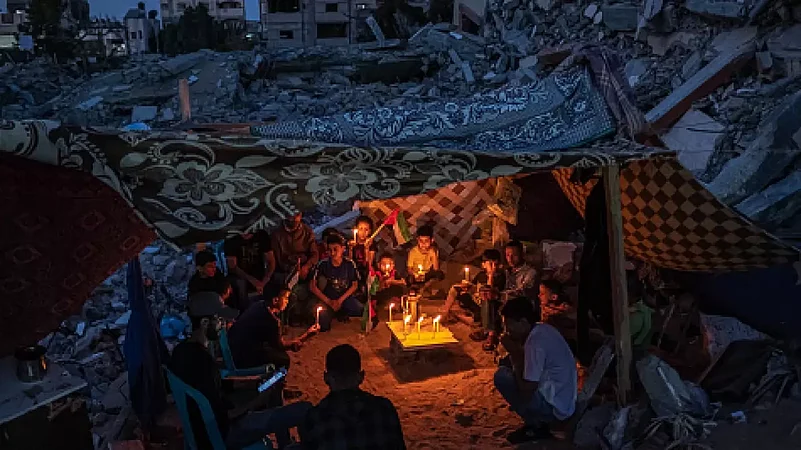In another call for an immediate ceasefire in the war in the Gaza Strip, the United Nations (UN) on Wednesday said it "strongly condemns" the escalation by Israel.
The UN's Committee on the Rights of the Child said in a statement that Israel's "grave human rights violations against children" in Gaza were mounting by the minute.
After three weeks of aerial and artillery bombardment in Gaza, Israel finally began its ground offensive in Gaza late last week. Even though it is a watered-down version of the full-fledged invasion that had been anticipated since the beginning of the war, the offensive and the accompanying intensified bombardment have worsened the situation for Gazans, particularly for the children, who have emerged as the worst sufferers of the conflict.
Almost half of all deaths reported so far in Gaza have been of children. Moreover, the loss of parents and other family members adds to the children's suffering.
The latest figures released by the Hamas-run Gazan authorities say at least 8,796 have been killed in Israeli attacks, of whom at least 3,648 are children. The total number of injured has been put at 21,543. As if the numbers were not enough, consider this: dozens of schools and medical facilities have been destroyed in addition to several thousands of houses and apartment buildings. In short, once the war ends, hundreds of thousands of children will not have schools to study in or houses to go back to. For children growing up amid constant artillery shelling and deaths and destruction, it's not just their present childhood that's being snatched but also a chance at a dignified future.
For oldtimers who either themselves saw or listened to the stories of the displacement during the 1948 Arab-Israel War, when around 700,000 Arabs were displaced in the fallout of the failed war against Israel by the six Arab countries, the current displacement of hundreds of thousands with little hope of going back to a life that once was appears nothing less than the second 'Naqba'.
At a place where even surgeries are compromised, one need not even mention the brewing mental health crises. Gaza, which has often been dubbed as an open-air prison for the dual siege —an external siege by Israel and Egypt and an internal siege by autocratic Hamas— it's under is already a hotbed for mental health crises. Even before the outbreak of the ongoing war, a report by Save the Children in 2022 concluded that 85 per cent of the children were suffering from depression. The present crises are set to worsen the situation.
Long after a war is over, people carry the scars of the conflict, commonly called post-traumatic stress disorder (PTSD). Dr. Esti Galili-Weisstub of Israel calls such people "eternal victims of wars and conflicts" — which are found on both side of the Israel-Gaza fence. A study shows as many as 90 per cent of Israeli children have shown signs of anxiety. The ongoing crises in Gaza, however, have little to no parallels in the recent past.
"The rates of acute and chronic malnutrition are high among the paediatric population in Gaza. Exacerbating this humanitarian crisis is the frequent lack of sufficient access to clean water and sanitation...Doctors Without Borders say the accumulation of traumatic events has resulted in an acute mental health crisis in Gaza. Children in war zones like Gaza who are exposed to violence are at a very high risk of developing a range of mental health problems, predominantly post-traumatic stress disorder, depression and psychosomatic disorders," notes Forbes in an article.
Palestinian activist Fadi Abu Shammalah shared that the blockade by Israel, imposed after the designated terrorist organisation Hamas took over the control of Gaza after driving out the internationally-recognised Fatah from Gaza, and the resultant suffering further fuels the militancy in the region. A father of three, he noted in an article for The New York Times that several of the attackers who went on a rampage in Israel on October 7 were not much older than his oldest child aged 13.
"Many of the fighters who breached those walls are probably just a few years older than Ali; many of them were born during the second intifada. Their entire experience has been Israeli military occupation, siege and devastating military assault upon an assault in an enclave of 140 square miles, with unemployment and poverty rates of approximately 50 per cent. This is the history, and these are the conditions that have shaped so many in Gaza, not a justification. Israel helped create these fighters by starving them of hope, dignity and a future," said Abu Shammalah.
At Outlook, we have documented the suffering of Gaza since the beginning of the war. In addition to our 01 November 2023 issue on the ongoing Israel-Hamas War, we have covered several aspects of the war.
Sharmita Kar has reported that there is little empathy in Israel for Gaza as social media users mock the deaths and destruction in Gaza with reels and memes.
It is said that a photograph speaks a thousand words. Here, we have collated photos that bring out the death and devastation in Gaza.


























